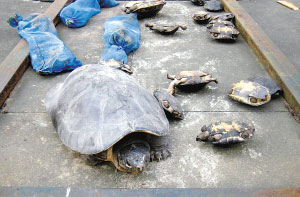| Home / Environment / News | Tools: Save | Print | E-mail | Most Read |
| 5,000 Smuggled Animals Abandoned at Sea |
| Adjust font size: |
About 2.8 percent of Chinese people regularly eat wild animals. In
Police seized more than 13,000 kilograms of smuggled wild animals in Locals said border police in Yangjiang intercepted a wooden ship full of wild animals that was anchored off the coast last Tuesday. On board, they found more than 5,000 rare animals kept in about 200 wooden cages. Among the animals were 2,720 monitor lizards, which are under first-class national protection; 30 pangolins, which are under second-class national protection; 44 leatherback turtles, which are also under national-level protection; 2,655 rare tortoises, which are under province-level protection; and 21 bears' paws. It was the biggest wild animal smuggling case in at least a decade, said a source with Guangdong Customs. "We did not find anybody on the ship. We only found a lot of wooden cases and a strong fishy smell that day," said Huang Xiaohong, the chief of Yangjiang frontier defense team. Police said the ship did not have a name or a license. Nor did it list a port of registry. This has made the task of identifying the smugglers very difficult, Huang said. The captive wild animals have been sent to
The center will also freeze the bears' paws, and then cremate them after the case is completed, Li said. According to a report in the local Guangzhou Daily, Yangjiang border police found a copy of the Nanyang Siang Pau, a Malaysian newspaper, on board the ship. Of the major illegal international businesses plaguing the area, animal smuggling is second only to drug smuggling in terms of scale. The profits are enormous because many of the people who sell such animals know nothing about the animals' endangered status. They sell them to smugglers for next to nothing. To serve as a positive example, almost all of ( |
| Tools: Save | Print | E-mail | Most Read |
 |
| Related Stories |
|
||||

